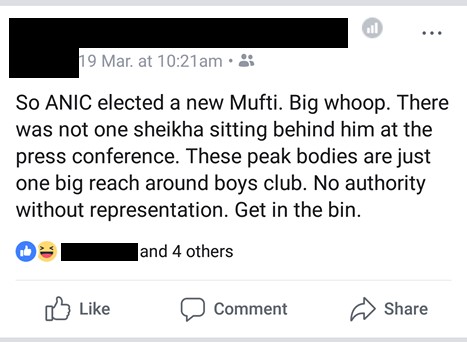
Recently, News Corp editor Peter Gleeson remarked, on a TV station hardly anyone watches, that “the Grand Mufti in Sydney doesn’t speak English — I don’t get that”. He’ll be pleased to know that the new (as of Sunday arvo) Mufti of Australia, Imam Abdul Aziem al-Afifi, speaks English, and arguably much better than Pauline Hanson.
Here’s what you need to know:
A contentious election process
Imam al-Afifi was elected in a process which remains disputed by prominent Sydney imams. Supporters of al-Afifi’s competitor, Lakemba-based Imam Yahya Safi, are already preparing to mount a community-based challenge which could see the matter end up in court. As the senior imam employed by the Lebanese Muslim Association, Imam Safi looks after Australia’s largest Muslim congregation.
The position of mufti is determined by a committee of the all-male Australian National Imams Council (ANIC), a body not to be confused with the almost exclusively male Australian Federation of Islamic Councils (AFIC). Both umbrella bodies claim to represent that fictitious entity called “the Muslim community”.
The AFIC itself has had no shortage of internal issues recently, including massive disputes with the Commonwealth over funding for its schools, and leadership stoushes that have included at least one office break-in. Past AFIC presidents include prominent feminist Mr Keysar Trad.
The ANIC could take some cues from the AFIC, which has spent huge sums of money on lawyers fighting its election and constitutional issues. In February 2017, Supreme Court Justice Robert McDougall described the AFIC’s internal brawls as “absolutely appalling”. “It seems to me that there are far more important things that AFIC can be focusing on, one of which is the rise, fuelled by populist politics and government policies, of anti-Muslim sentiment in this country,” he said. It was something, he added, that he personally deplored.
As, likely, do 450,000 Muslim Aussies. Which raises the question as to why the AFIC became involved in the latest stoush in the ANIC: AFIC’s president, Dr Rateb Jneid, was overseas when Imam al-Afifi was being elected mufti, but in his absence acting president Jamal El-kholed wrote a letter in favour of his competitor, Safi, alleging he was the only legitimate nominee. The letter also called upon the Imams’ Council not to be insular. (Speaking of insular, the Lebanese Muslim Association membership rules state that women cannot become full members nor can non-Lebanese men.)
Upon his return, Dr Jneid first issued a letter saying that “AFIC has NOT made any decisions in relation to those matters nor any official statements”. A subsequent two-page statement was issued stating that AFIC supported the election of Imam al-Afifi.
So who is the new mufti?
According to the official biography provided by ANIC, Imam al-Afifi was born in Egypt, though no birth date has been provided. He studied in the traditional manner, directly under classically trained scholars. He graduated with three ijaza (literally “authorisation to teach”, roughly equivalent to an Honours degree) and moved to Jordan in 1994 to work for six years for the Ministry of Religious Affairs. Moving to Australia in 2000, he now works at an independent school and mosque in outer-Melbourne.
One important fact the bio doesn’t mention is that the Imam is apparently a Richmond supporter.
Does this matter?
The actual role of the mufti remains undefined. There is no position description, no selection criteria, no KPIs. Different Muslim cultures give different roles to imams and muftis. One thing that the mufti is supposed to do is provide non-binding opinions on novel legal issues. Which means a mufti is supposed to be an expert in the sacred law. Poor Imam al-Afifi is an expert in different ways to recite the scripture, not in law. Is he really qualified? Maybe a better question to ask is: who cares?
Most Muslims are only worried about our imams getting their act together and determining that religious holidays are all held on a uniform date. At other times of the year, we just wish imams would avoid any public discussion on contentious issues such as women’s dress or terrorism.
What’s more, the ANIC doesn’t represent all imams. There are no qualified female religious authorities within the council. And so perhaps the best summation of the election, and its relevancy to modern Australian Muslims, comes from a Facebook post by a Muslim woman: “So ANIC elected a new mufti. Big woop. There was not one sheikha [female imam] sitting behind him at the press conference. These peak bodies are just one big reach around boys club. No authority without representation. Get in the bin.”









Thanks a lot Irfan. Just what Aussie Muslims need, the bucket tipped on our multifaceted “community” and imperfect institutions by “one of our own.” Most likely the new Mufti, if confirmed in the position, will give any advice to the community after consultation with his many colleagues in the Imams’ organisation. In any case our international Muslim community will also seek advice from other qualified individuals, some of whom have had the degree of Mufti conferred on them by Islamic universities.
Just what this country needs – a new leader of a bunch of racist, misogynist, obscurantist, obfuscatory bigots.
I wonder how much school funding bumBoil Shlernt will promise for this perpetuation of religious division – current court cases notwithstanding.